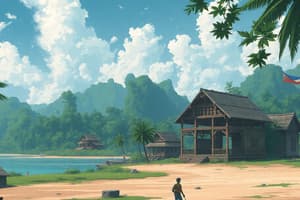Podcast
Questions and Answers
What key theme covers the effects of Philippine history on present society?
What key theme covers the effects of Philippine history on present society?
- Philippine Independence
- Political Structure
- Historical Impact (correct)
- Cultural Diversity
Which natural disaster is commonly a concern in the Philippines?
Which natural disaster is commonly a concern in the Philippines?
- Tornadoes
- Floods
- Wildfires
- Typhoons (correct)
In Philippine governance, which branch is responsible for creating laws?
In Philippine governance, which branch is responsible for creating laws?
- Executive
- Local
- Judicial
- Legislative (correct)
What is the primary focus of the study of cultural heritage in Araling Panlipunan 6?
What is the primary focus of the study of cultural heritage in Araling Panlipunan 6?
Which island group is not one of the three major groups in the Philippines?
Which island group is not one of the three major groups in the Philippines?
What is a common consequence of Martial Law in Philippine history?
What is a common consequence of Martial Law in Philippine history?
What role do barangays play in local government?
What role do barangays play in local government?
Which contemporary issue is a major concern in the Philippines today?
Which contemporary issue is a major concern in the Philippines today?
Flashcards are hidden until you start studying
Study Notes
Araling Panlipunan 6 Overview
- Subject Focus: Araling Panlipunan 6 is centered on the study of Social Studies in the Philippines, covering history, geography, culture, and governance.
- Key Themes:
- Philippine history and its impact on present society
- Understanding of local and national government structures
- Cultural diversity and heritage in the Philippines
- Geography of the Philippines including landforms, climate, and resources
Historical Context
- Philippine Independence: Study the timeline and key events leading to the country's independence.
- Colonial Influences: Examine the Spanish and American colonial periods and their effects on Filipino culture and governance.
- Martial Law: Understand the implications and consequences of Martial Law in Philippine history.
Geography
- Archipelagic Nature: The Philippines consists of over 7,000 islands; understand major island groups (Luzon, Visayas, Mindanao).
- Natural Resources: Key resources include minerals, agricultural products, and marine resources.
- Environmental Issues: Discuss problems like deforestation, pollution, and natural disasters (typhoons, earthquakes).
Government and Citizenship
- Political Structure: Understand the roles of the executive, legislative, and judicial branches of government.
- Local Government: Explore the functions and responsibilities of barangays, municipalities, and cities.
- Rights and Responsibilities: Emphasize the rights of citizens and their responsibilities in the community.
Culture and Society
- Cultural Heritage: Study the various cultures of different Philippine regions (festivals, languages, practices).
- Influences on Culture: Examine the impact of colonialism, globalization, and modern influences on Filipino culture.
Current Events
- Contemporary Issues: Discuss current socio-political issues affecting the Philippines, including poverty, education, and health care.
- Globalization Effects: Understand how global changes impact local communities and economies.
Skills Development
- Critical Thinking: Encourage analysis of historical events and current issues.
- Research Skills: Promote effective research methods using various sources of information.
- Community Engagement: Foster awareness and involvement in local government and community programs.
Araling Panlipunan 6 Overview
- Subject Focus: Araling Panlipunan 6 is a Social Studies course focusing on the Philippines' history, geography, culture, and governance.
- Key Themes:
- Philippine history's impact on the present.
- Understanding local and national government structures.
- Emphasizing cultural diversity and heritage in the Philippines.
- Exploring the geography of the Philippines, including its landforms, climate, and resources.
Historical Context
- Philippine Independence: Studying the timeline and significant events leading to the country's independence is crucial.
- Colonial Influences: Examining the Spanish and American colonization periods and their effects on Filipino culture and governance.
- Martial Law: Understanding the ramifications and consequences of Martial Law in Philippine history is vital.
Geography
- Archipelagic Nature: The Philippines is an archipelago with over 7,000 islands; understanding major island groups like Luzon, Visayas, and Mindanao is essential.
- Natural Resources: Key resources include minerals, agricultural products, and marine resources.
- Environmental Issues: Understanding challenges like deforestation, pollution, and natural disasters (typhoons, earthquakes) are crucial to understanding the Philippines' environment.
Government and Citizenship
- Political Structure: Students should understand the roles of the executive, legislative, and judicial branches of government.
- Local Government: Exploring the functions and responsibilities of barangays, municipalities, and cities helps students understand the hierarchy of government.
- Rights and Responsibilities: Emphasizing the rights of citizens and their responsibilities within the community is vital.
Culture and Society
- Cultural Heritage: Studying the diverse cultures of different Philippine regions, including their festivals, languages, and practices is crucial.
- Influences on Culture: Examining the impact of colonialism, globalization, and modern influences on Filipino culture is essential.
Current Events
- Contemporary Issues: Discussions about current socio-political issues affecting the Philippines, including poverty, education, and healthcare, are essential.
- Globalization Effects: Understanding how global changes impact local communities and economies is essential in today's world.
Skills Development
- Critical Thinking: Developing analytical skills when examining historical events and current issues is crucial.
- Research Skills: Promoting effective research methods using various sources of information is important.
- Community Engagement: Fostering awareness and involvement in local government and community programs helps students become active citizens.
Studying That Suits You
Use AI to generate personalized quizzes and flashcards to suit your learning preferences.




